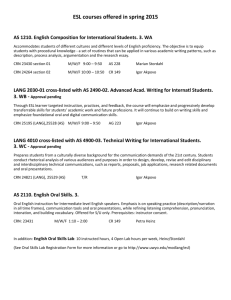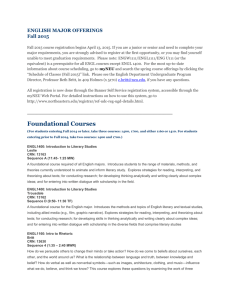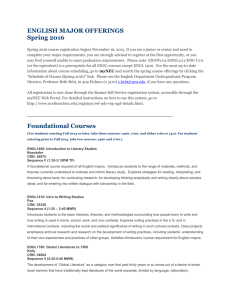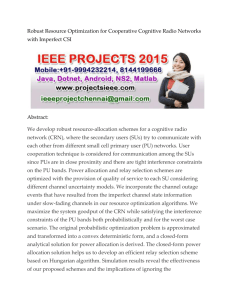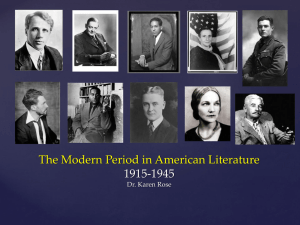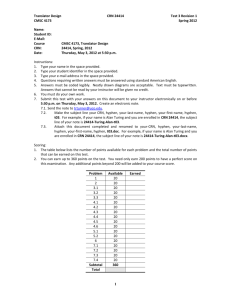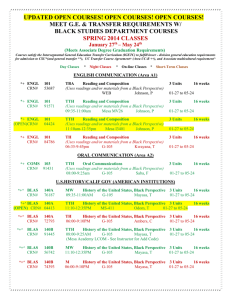Spring 2015 Courses - Northeastern University
advertisement
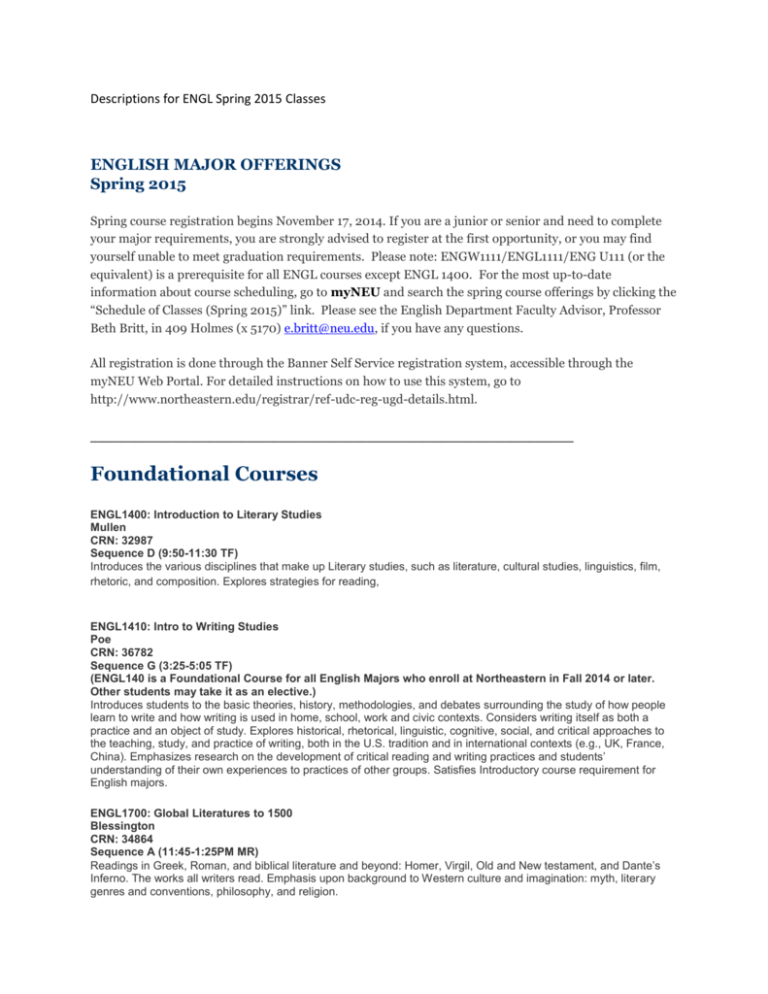
Descriptions for ENGL Spring 2015 Classes ENGLISH MAJOR OFFERINGS Spring 2015 Spring course registration begins November 17, 2014. If you are a junior or senior and need to complete your major requirements, you are strongly advised to register at the first opportunity, or you may find yourself unable to meet graduation requirements. Please note: ENGW1111/ENGL1111/ENG U111 (or the equivalent) is a prerequisite for all ENGL courses except ENGL 1400. For the most up-to-date information about course scheduling, go to myNEU and search the spring course offerings by clicking the “Schedule of Classes (Spring 2015)” link. Please see the English Department Faculty Advisor, Professor Beth Britt, in 409 Holmes (x 5170) e.britt@neu.edu, if you have any questions. All registration is done through the Banner Self Service registration system, accessible through the myNEU Web Portal. For detailed instructions on how to use this system, go to http://www.northeastern.edu/registrar/ref-udc-reg-ugd-details.html. _____________________________________________________________________________ Foundational Courses ENGL1400: Introduction to Literary Studies Mullen CRN: 32987 Sequence D (9:50-11:30 TF) Introduces the various disciplines that make up Literary studies, such as literature, cultural studies, linguistics, film, rhetoric, and composition. Explores strategies for reading, ENGL1410: Intro to Writing Studies Poe CRN: 36782 Sequence G (3:25-5:05 TF) (ENGL140 is a Foundational Course for all English Majors who enroll at Northeastern in Fall 2014 or later. Other students may take it as an elective.) Introduces students to the basic theories, history, methodologies, and debates surrounding the study of how people learn to write and how writing is used in home, school, work and civic contexts. Considers writing itself as both a practice and an object of study. Explores historical, rhetorical, linguistic, cognitive, social, and critical approaches to the teaching, study, and practice of writing, both in the U.S. tradition and in international contexts (e.g., UK, France, China). Emphasizes research on the development of critical reading and writing practices and students’ understanding of their own experiences to practices of other groups. Satisfies Introductory course requirement for English majors. ENGL1700: Global Literatures to 1500 Blessington CRN: 34864 Sequence A (11:45-1:25PM MR) Readings in Greek, Roman, and biblical literature and beyond: Homer, Virgil, Old and New testament, and Dante’s Inferno. The works all writers read. Emphasis upon background to Western culture and imagination: myth, literary genres and conventions, philosophy, and religion. Literary Periods Early Literatures ENGL3678: Bedrooms and Battlefields: Hebrew Bible and the Origins of Sex, Gender, and Ethnicity Lefkovitz CRN: 36631 Sequence B (2:50-4:30 MW) Bedrooms and Battlefields: Sex, Gender, and Ethnicity in the Hebrew Bible (Old Testament) First stories—stories that come to be considered origin stories—have a powerful influence on people and culture. In every generation, writers wrestle with first stories. We will read stories from Hebrew Scripture in English translation, beginning with the Garden of Eden through the Book of Ruth, asking how these foundational narratives establish the categories that have come to define our humanity. We will look at how the Bible’s patterns of representation construct sexual and ethnic identities and naturalize ideas about such social institutions as “the family.” These patterns include the Bible’s bedrooms and battlefields, repeated stories of identity masquerade, and metaphors of fluids and voices. We will read the Bible as a collection of stories that sets in motion one trajectory of the Western narrative tradition, and we will interrogate some of the basic assumptions of that tradition. 17th-18th Centuries ENGL2250: 18th Century British Literature Peterfreund CRN: 36619 Sequence A (11:45-1:25PM MR) The eighteenth century in England marked the return of relative social stability after a century notable for societal unrest, civil war, and the disruption of the English monarchy. This course will focus on the period’s ongoing attempt to identify the principles of its Englishness and to reform or build its idea of English community—and, by extension, its idea of English society—in accord with those principles. The texts to be studied include the poetry, fiction, and nonfiction prose of the period. Grades will be assigned on the basis of take-home essay examinations. ENGL3160: Topics in 17th/18th Century British Literature: Becoming Human Leslie CRN: 36625 Sequence D (9:50-11:30 TF) The boundaries of the human came into visibility in the early modern period primarily through a series of border skirmishes. The relationship between man and beast, man and woman, man and machine, flesh and spirit, matter and mind were all subjects of fierce debate, whose terms did not generally resolve into strict or stable binaries. Indeed, early modern print culture is well-populated by monsters, faeries, sprites, savages, hermaphrodites, talking animals, automata, and other creatures who complicated notions of human exceptionalism, autonomy, or dominion. We will explore how neoclassical idealism, Cartesian dualism, New World exploration, and the New Science’s discoveries all contributed to the controversies over what it meant to be human and led to the production of whole new disciplines as well as newly emerging and intersecting systems that described gender, racial, and species difference. Course requirements will include an archival project and a research paper. ENGL3618: Milton Blessington CRN: 36629 Sequence 3 (10:30-11:35PM MWR) Students will read Paradise Lost with supplementary readings in the minor poems and prose. The course’s emphasis will be upon Milton as a writer of poetry. Midterm, final, paper, and short reports. 19th Century ENGL3619: Emerson and Thoreau Davis CRN: 36630 Sequence 4 (1:35-2:40PM MWR) This course will take a close look at the essays, poetry, and journals of Ralph Waldo Emerson and Henry David Thoreau, two nineteenth-century American writers and friends. In their often whimsical, prophetic, philosophical and at times personal writings, they each considered what it would mean to think that a new day was dawning in human existence: how might persons live to their true potential, in harmony with nature and with society? In addition to studying these writers' literary and philosophical achievements, we’ll consider their troubled friendship, and their circle of colleagues, friends, and rivals. Requirements: three six to seven page papers and a reading journal. This course will include a fieldtrip to Concord, Mass., where Emerson and Thoreau both lived. 20th/21st Centuries ENGL2440: Modern Bestseller Goshgarian CRN: 36623 Sequence 2 (9:15-10:15 MWR) "Bestseller" is an artificial category determined solely by numbers of books sold. However, we will explore some reasons behind the success of recent quality fictional best-selling--i.e., what special fantasies, obsessions, themes, plot lines, characters, action etc. appeal to popular tastes. The selections will represent a cross-section of mainstream and genres titles—e.g., thriller, mystery, "literary," etc.--by men and women, some of whom who have become brand names. Guest bestselling author(s) will visit class. We will also watch and discuss movies made from the works studied in the course. Student writing: announced quizzes; midterm & final take-home essay exams (7-10 pages each). Optional critical paper (7-10) pages analyzing a bestselling novel not read in the course. ENGL3210: Topics in 20th/21st Century Literature: Harlem Renaissance Kaplan CRN: 36626 Sequence E (11:45-1:25PM WF) The Harlem Renaissance was a cultural explosion considered unprecedented even in its own day and notable as much for troubling paradoxes as for extraordinary productivity. On the one hand, Harlem was black America’s Mecca, “the symbol,” as Adam Clayton Powell Sr. put it, “of liberty and the Promised Land to Negroes everywhere” -the ideal, after decades of devastating racism, of black self-determination and self-definition; and the idea, entirely novel at the time, of eschewing white values and standards to, instead, embrace Blackness. And yet, the Harlem Renaissance was also thoroughly and complexly interracial: financially underwritten by many white philanthropists; promoted by white editors, publishers, gallery owners and theater producers; and deeply influenced – including in its black self-definitions – by a range of white writers, musicians, visual artists, actors, editors, publishers, political activists, and more. This interracialism – and its many attendant ironies and complexities – is deeply embedded into the fabric of Harlem Renaissance writing. But how successfully have literary historians accounted for this texture? For the Harlem Renaissance’s myriad ties to both modernism and realism? We will read a range of Harlem Renaissance writers, including Langston Hughes, Nella Larsen, Jessie Fauset, James Weldon Johnson, W.E.B. DuBois, Claude McKay, Mary White Ovington, Nancy Cunard, Josephine Cogdell Schuyler, George Schuyler, Zora Neale Hurston, Wallace Thurman, Bruce Nugent, Countee Cullen, Carl Van Vechten, and others, to re-consider this perennially fascinating period and, at the same time, inquire critically into how it has fascinated us, and why. This will be a reading-intensive discussion seminar, requiring one short paper, a longer seminar paper, and active participation. Comparative and Tranhistorical/Transnational ENGL1500: British Literature 1800 Boeckeler CRN: 34863 Sequence D (9:50-11:30AM TF) Read the greatest hits of English Literature until 1800 in one, action-packed semester: fight scenes and motherbashing in Beowulf; sex, lies, and religious pilgrims in The Canterbury Tales; King Arthur and the adventures of the knights of the round table; the best and worst places in the universe according to Utopia and Paradise Lost; raunchy poetry about skulls, love triangles, shipwrecks, fleas and worms, wearing wings, and forsaken lovers; a trip to fairyland in The Faerie Queene; a racy roman à clef by a woman publicizing her scandalous affair with a first cousin in The Countess of Montgomery’s Urania; and Shakespearean play thrown in for good measure. Assignments include weekly reading exercises, some memorization of weird poetry, a mix of formal and informal writing, and a take home exam. ENGL2370: Modern Short Story TuSmith CRN: 36621 Sequence 4 (1:35-2:40PM MWR) This course explores a range of American short stories by a diversity of prominent writers from 20th and 21st centuries. Short story cycles are examined for their artistic aspects (e.g., narrative structure, point of view, visual imagery, linguistic experimentation, thematic development) within their appropriate social/historical context. Requirements include brief weekly responses to readings (posted on Blackboard), textual explications, annotations of scholarly articles, and a final analytical paper. ENGL3398 Topics in Genre: Memoirs TuSmith CRN: 36627 Sequence B (2:50-4:30PM MW) This course examines the modern/contemporary American memoir as a literary genre. Narrative theory on nonfictional prose (memoir, autobiography, personal narrative) informs its critical methodology and provides solid foundation for a range of culturally diverse texts. We will consider each work from both the reader’s and writer’s perspective. Requirements include brief weekly responses to readings (posted on Blackboard), short papers (textual explication, personal narrative, annotation of scholarly article), and a final paper. ENGL3572 Fantasy Kelly CRN: 36628 Sequence B (2:50-4:30 MW) In The Craft of Fiction, the 1921 study that enshrined the opposition between showing and telling in modern critical consciousness, Percy Lubbock begins his discussion of Flaubert by asserting that the art of fiction does not begin until the novelist thinks of his story as a matter to be shown, to be so exhibited that it will tell itself. . . . The book is not a row of facts; it is a single image. . . . Narrative—like the tales of Defoe for example—must look elsewhere for support; Defoe produced it by the assertion of the historic truthfulness of his stories. But in a novel, strictly so called, attestation of this kind is, of course, quite irrelevant; the thing has to look true, and that is all. (62) And this is where we will begin: how is it that fantasy worlds—parallel worlds, or worlds laid on top of the “real” world, and/or worlds powered by magic—look true? Why is it that so many of us desire to suspend our disbelief in order to enter into the worlds of C.S. Lewis, Ursula K. Le Guin, George R.R. Martin, J. K. Rowling, J.R.R. Tolkien, and others? (And why do fantasy writers have so many initials?) We’ll begin by reading Libriomancer (Jim C. Hines, 2012), a tale about wizards who have developed the ability to reach into any book and pull out any object they desire. (Sounds like reading to me, or at least an allegory for reading!) We’ll read a few classics, such as The Wind in the Willows (Kenneth Grahame, 1908), The Hobbit (J.R.R Tolkien, 1937), and The Lion, the Witch, and the Wardrobe (C. S. Lewis, 1950), and discuss the film adaptations as well. We’ll read War for the Oaks (Emma Bull, 1987), a fine example of urban fantasy, and The Left Hand of Darkness (Ursula K. Le Guin, 1969)—sci-fi, granted, but fantasy-like: the book presents an opportunity to talk about genre in/and speculative fiction. We’ll also move back in time and read The Mabinogion, a compilation of medieval Welsh tales of faerie and magic, and the artful modern retelling, Children of Lyr (Evangeline Walton, 1971). And there’s a marvelous film adaptation. I’ve saved time for the class to research and then choose two novels for everyone to read. (Familiarity with the Harry Potter books and/or films assumed, as well as a knowledge of Game of Thrones/A Song of Ice and Fire . . .) Requirements: two brief response papers, a brief presentation on an example of fantasy in other media (graphic novels, video games, music, painting), and two six-page formal papers, the first due at midterm and the second at the end of the course. Theories & Methods ENGL3339: Topics in Literary Criticisms: Queer Theory Mullen CRN: 34866 Sequence F 1:35-3:15 TF This course will introduce students to queer culture and critique from the 1890s to the present. We will read across a range of literary, historical, scientific and critical texts and will also engage other media notably film and visual arts. We will examine the emergence of sexuality as an institutional discourse and as a mode of counter discourse. Students will read works from diverse national traditions, both major and minor figures, as we attempt to both queer the canon and to recuperate lost queer histories. Authors might include: Wilde, Woolf, Proust, O’Brien, and Baldwin, along with critics such as Freud, Foucault, Butler, and Berlant. We will also have the chance to meet contemporary writers and artists. Requirements include a series of short writing assignments and a longer research paper at the end. ENGL3381 Processes of Writing and Tutoring Gonso CRN: 33842 Sequence 3 (10:35-11:35AM) The purpose of “Processes of Writing and Tutoring” is three-fold: It is designed to help students reflect on and improve their writing. It is also designed to help students explore and understand the complex processes involved in written composition. Finally, it is designed to prepare students to become writing consultants, whether at the Northeastern Writing Center or at various educational sites, including community literacy agencies and Boston-area public schools (As part of participating in an experiential-learning course, students will be required to spend approximately 3-4 hours per week “experiencing” the act of tutoring writing at partner sites.). As consultants, students will be able to apply the knowledge they are gaining in the course to help other students improve their writing. To accomplish these goals, we will (a) examine what researchers and theorists have said about writing, (b) examine what theorists and practitioners have said about teaching in a conference setting, and (c) observe, examine, and reflect upon our own experience as writers and tutors. Students will produce in a wide variety of genres, conduct primary research on their tutoring sessions, respond to readings and reflect on experiences, and present in-class activities on the teaching of writing. ENGL 3381 satisfies the experiential learning and writing-intensive requirement for English majors and is an elective option for Rhetoric minors. LING1150: Introduction to Language and Linguistics Section CRN Sequence Days & Time Instructor 1 30495 4 1:35-2:40pm MWR Randall 2 30379 3 10:30-11:35am MWR Painter 3 32092 3 10:30-11:35am MWR Randall 4 32292 D 9:50-11:30am TF Cooper 6 32293 F 1:35-3:15pm TF Cooper Fulfills the Arts/Humanities Level 1 requirement in the NU Core Experiential Education ENGL3381 Processes of Writing and Tutoring (See description under Theories and Methods) Writing (These courses count as electives for students entering Northeastern before Fall 2014) ENGL3378: Fictional Workshops Goshgarian CRN: 37036 Sequence 3 (10:30-11:35AM MWR) This is a fiction-writing workshop, the objective of which is to get you started on the novel you always wanted to write. With an eye to producing material worthy of publication, our primary objective is for you to produce at least two solid chapters (the first and a subsequent chapter) and an enticing synopsis which will serve as bases to develop and eventually present to a literary agent and or editor. Any fictional genre is acceptable—mainstream, literary, mystery, thriller, horror, science fiction, romance, western, etc.—all but vampire or zombie stories. Those have been overdone. I do not encourage writing short stories since they don’t sell. You will be expected to read your own material in class for roundtable response and to offer comments on others’ material. Maximum 15 students. ENGL3377: Poetry Workshop Peterfreund CRN: 33841 Sequence 4 (1:35-2:40PM MWR) This course surveys the six canonical male English Romantic poets: William Blake; William Wordsworth; Samuel Taylor Coleridge; George Gordon, Lord Byron; Percy Bysshe Shelley; and John Keats. The course also incorporates writing by prominent female poets of the period, such as Anna Laetitia Barbauld, Joanna Baillie, Felicia Hemans, and Elizabeth Laetitia Landon. All of these poets wrote during the English Romantic Period (1789-1832), an era of significant social and intellectual change, although this change was not without its turbulence, confusion and, on too many occasions, its violence. The period was one in which English culture moved beyond traditional modes of knowledge, social organization, and belief, and into an intellectual, sociopolitical, and religious milieu in which the only certainty was uncertainty and the only constant was change. We will study the impact of the era on the individual, and the artistic response of that individual to the era. Students functioning in small work groups will take responsibility for framing some of the questions we should address in response to our reading. Grades in this course will be determined on the basis of three five-to-seven-page papers, written on topics chosen from a list of options. Capstone ENGL4710 Capstone Seminar: Naturalist Fiction Davis CRN: 30613 Sequence A (11:45-1:25 MR) What did the coming of modernity feel like for the human beings who lived at the dawn of the twentieth century? For American naturalist writers including Frank Norris, Theodore Dreiser, Kate Chopin, Stephen Crane, and Edith Whatron, the world was a complex of social and natural forces against which individual subjects struggled mightily but often fruitlessly. We will consider the aesthetic, historical, and political aspects of complex fictions of the individual shaped by both the destiny of biological being and by the driving force of historical change. This course will also include consideration of major critical and theoretical texts on naturalism. Requirements: three six to seven papers and a final presentation.
